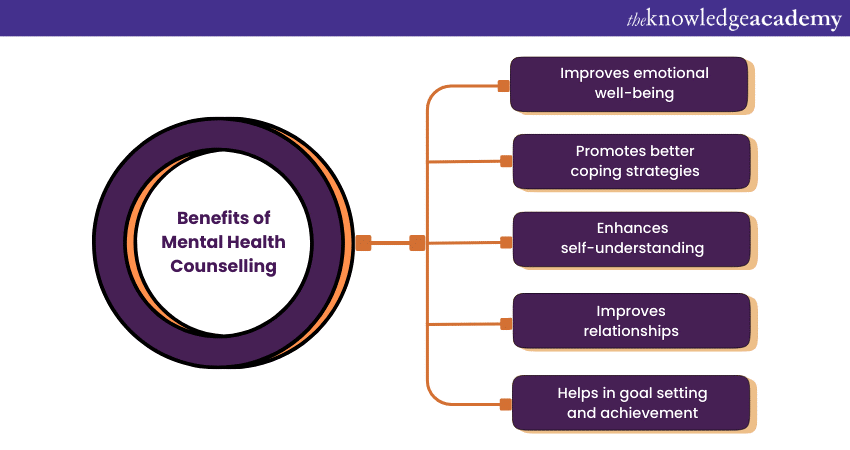More About Mental Health Counseling
Rumored Buzz on Mental Health Counseling
Table of ContentsSome Known Facts About Mental Health Counseling.A Biased View of Mental Health CounselingHow Mental Health Counseling can Save You Time, Stress, and Money.The 10-Minute Rule for Mental Health Counseling8 Easy Facts About Mental Health Counseling Explained
Through therapy, you can acquire understanding right into your own patterns of behavior and communication, which can lead to more meeting and pleasing partnerships with friends, family, and romantic companions. What we believe, we materialize. If you're consumed with negative feelings and adverse ideas that are disrupting your life, therapy can aid., or there are other adverse methods you behave. Treatment can help you modify those behaviors that are having an adverse effect on your world and connections.

The value of therapy exceeds your mental health and wellness. Getting treatment to address specific aspects of your life can aid you be much more effective in other areas, consisting of work. Some research study has actually even revealed that there's a straight relationship between looking for mental health and wellness aid and a reduction in missed out on job.

More About Mental Health Counseling
There are even more advantages of treatment than simply the ones we have talked about., or build relationships (enchanting or those with family members or good friends) in a healthy and balanced method.
For the purpose of the present research, regarded benefits and barriers to psychological health and wellness help-seeking are being checked out. Previous research located that viewed barriers have a significant result on university student' wellness habits choices (Von Ah, Ebert, Ngamvitroj, Park & Kang, 2003). Perceived advantages and barriers to help-seeking were especially chosen due to their impact on decision-making and inevitably activity (Glanz, Rimer, & Su, 2005).
The existing study looks for to check out whether or not stigma serves as an obstacle to therapy amongst college students. Among these were: (1) liking to deal with psychological health problems themselves, (2) not having enough time to take part in treatment, (3) concerns concerning whether psychological wellness treatment is effective in remediating issues, (4) a belief that anxiety is regular or the trouble will certainly obtain better without treatment, (5) lack of money, and (6) worry regarding what others would certainly assume if they found out regarding treatment participation.
Staff in university psychological health and wellness centers might be regarded as unfriendly, and long wait times for services might be "repulsive" for useful site trainees. Variables promoting a lot more positive attitudes are usually at the contrary pole of those factors recognized as obstacles.
Little Known Questions About Mental Health Counseling.
One in three (34.6%) reported surviving school and one in four (23.3%) reported dealing with moms and dads. Nearly fifty percent of students were associated with campus organizations and 1 in 10 reported remaining in a society or sorority. Greater than one-third of pupils (38.1%) reported that they had a member of the family or good friend with a diagnosed mental wellness disorder.

The 25-Second Trick For Mental Health Counseling
Univariate F-tests determined specific subscale items that significantly differed. Females were less most likely than men to regard people that most likely to therapy as mentally weak, people that most likely to counseling as crazy, to feel that people with psychological illness must deal with problems by themselves, that people that go to counseling description as unable to address troubles, that individuals who most likely to therapy are lazy, and to feel that people that go to counseling are various from typical people in an official source adverse means.
In a similar way, study results disclosed that females were dramatically less most likely than males to hold stigma-related mindsets. This is constant with previous research which likewise located that males hold higher degrees of perceived stigma than ladies (Chandra & Minkovitz, 2006). Based on study searchings for, it appears that males might be much less likely than women to look for therapy due to reduced regarded obstacles in addition to high stigma-related attitudes.
Mental Health Counseling - Truths
On top of that, university health professionals may offer curricula targeting males with information on the benefits of mental health therapy and the importance of seeking help when needed. All strategies should be assessed with future research study to figure out the impact on university student, particularly males. In contrast to basic populace researches which reveal that women are most likely to seek out mental health solutions contrasted to males (Haunstein et al., 2006; Mackenzie, Gekoski, & Knox, 2006), the here and now research located no substantial distinctions in the variety of viewed obstacles to help-seeking habits based on sex.
Researchers guess that this is mostly as a result of conventional social norms and gender functions that identified men based upon toughness and lack of emotional expression (Addis & Mahalik, 2003; Ang, Lim, Tan, & Yau, 2004; Mojtabai, 2007). On the whole, there have actually been mixed results among the university trainee populace pertaining to sex differences (Rosenthal & Wilson, 2008). This searching for was unexpected and might highlight that those who had obtained counseling had a far better idea of wait times and various other "access" obstacles that may make it hard to begin therapy. Perhaps, individuals that have gotten therapy view a lot more obstacles than individuals who have actually not received therapy since seeking therapy services once again can entail worry of self-disclosing individual details to a new counselor.